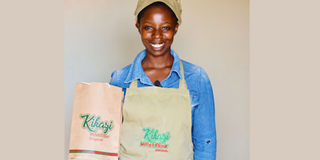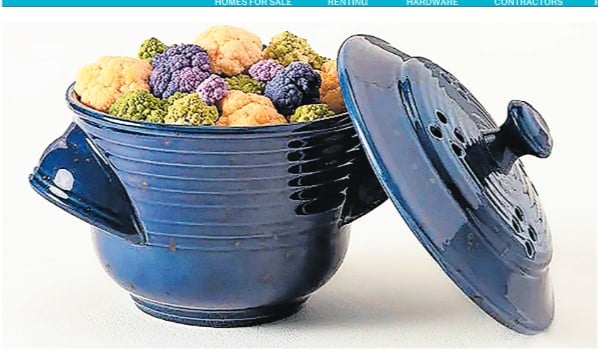Kikazi adding value to finger millet

Grace Kikazi packages clean millet flour to urban consumers. Through training, she moved from her home in Kireka to a rented house in Kyaliwajjala. PHOTO/George Katongole
What you need to know:
Millet value-based products enhance enterprise opportunities for all. Young entrepreneur Grace Kikazi is adding value to millet making it acceptable to diverse groups of people.
Grace Kikazi is an ambitious young entrepreneur whose fortunes have been turned around by adding value to local African finger millet.
Finger millet is an important subsistence crop in small scale cereal-based farming systems especially western, eastern and northern Uganda. It is mainly brewed into local beer or sold directly as grain in local markets where it is consumed for food. Millet is most important cereal after rice, sorghum and wheat and is a staple food for thousands of years in many parts of Africa and India.
With the changes in utilisation of processed products and awareness of the consumers about the health benefits, finger millet has gained importance because of its functional components, such as slowly digestible starch and resistant starch, exceptionally rich in calcium compared to all other cereals and an excellent plant source of natural iron.
Several processing technologies have improved nutritional characteristics of millet but its utilisation as food is still limited to populations in rural areas. This is due to the lack of innovative millet processing technologies.
According to Kikazi, by adding value to millet, she has been able to prepare products acceptable to both rural and urban consumers.
Starting out
Founded in 2019, Kikazi’s journey from a small-scale cottage industry to a flourishing enterprise is a testament to the power of building partnerships and never stopping to learn.
Kikazi, the founder of Kikazi Millet Flour, was inspired by a mother in Fort Portal who needed quality millet flour for a diabetic patient.
Hailing from the millet-rich region of Bushenyi, Kikazi saw the potential and gradually began her millet flour venture on a small scale. In 2020, she decided to take it more seriously, but the Covid-19 pandemic posed initial challenges.
With a modest initial investment of Shs3m from her savings, Kikazi ordered millet grain from farmers in western Uganda. She sorted and cleaned the grain before packaging it. In the beginning, production was limited to a few bags, each weighing around 100kg. Kikazi outsourced the grinding machine and carried out packaging at her home in Kireka, operating as a cottage industry.
“But it would mess the house. Millet flour was everywhere and I was not very comfortable working from home,” she says.
With two employees in her two-room rented workshop and delivery agents, Kikazi ensures top quality flour is produced free from sand, stones and aflatoxins.
Training
Kikazi enrolled for a training program code-named Enhancing the Competitiveness of Small and Medium Enterprises in Uganda (ECOS) which was funded by GIZ. The two-year program which ended in October 2023 was implemented by the Agribusiness Development Centre (ADC) through their Business Accelerator Program (BAP) with an aim of supporting women entrepreneurs.
During the training, the women entrepreneurs are exposed to different aspects of business management including business canvas modelling, governance, risk management, marketing, financial management, and financier’s requirements, among others. Apart from training, the trainees are linked to financing or markets.
In April of this year, Kikazi received guidance from an expert associated with ECOS, a project aimed at enhancing the competitiveness of Ugandan SMEs. The expert emphasised the need for a solid structure to scale up her business. It was during this time that Kikazi was introduced to ADC and embarked on a journey of learning.
Under the guidance of BAP trainers, Kikazi successfully registered her business, obtained a trademark and a UNBS quality mark, and registered with Uganda Revenue Authority (URA).
Through the Business Accelerator Program, she gained crucial insights into corporate governance, organisation, and formal business registration.
“There are quite a number of things I thought I should implement though I haven’t implemented them yet. What I did for example, I shifted from home. I learnt that proper record keeping is really important. I also learnt that I don’t need to do everything on my own. Previously, Kikazi was registered as a just a business name, I learnt that if you keep in that area you stay small and can’t scale up, you can’t be a supplier and you can’t be profiled in a government database,” she says of her learnings.
BAP also highlighted the significance of digital marketing in today’s era, leading her to establish an online presence for Kikazi.
Aspirations
Kikazi aspires to acquire a high-quality milling machine and secure financing for marketing efforts. She is also focused on establishing robust corporate governance structures and efficient sales management systems for Kikazi.
“With the linkages the programme exposed me to, I am sure of securing financing to have all this done and be able to tap into the export market,” she says.
Packaging her flour in hygienically food-grade paper bags, Kikazi Flour is sold to supermarkets in Mukono and Wakiso District.
From her quality flour, she educates people how to make bushera, kitiribita (a local energy booster), nturire and pastries among others.
“I encourage everyone to consider millet in their daily diet. Millet is very nutritious. If people consume our products, we can continue supporting smallholder farmers with good prices,” she says.




